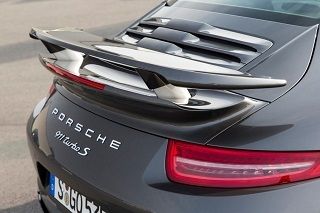From Guest Blogger Christopher Austin: Porsche Makes the 911 Greener by Adding Turbocharging Engines

Porsche has recently mentioned that their newest 911 model has a turbocharged engine. The sports car was conceived to meet challenging CO2 emission rules and demanding fuel economy. According to Porsche, the brand new engine will provide a 20 hp boost on present engines while at the same time diminishing emissions. The car was unveiled on September 15, in Frankfurt.
A Porsche official mentioned that the company is moving onto turbo-charged engines because of current emission rules, which are stricter than ever before. They will still provide naturally-aspired engines on several car types, including the GT3; although on a larger scale, there will be an almost complete shift to turbocharged engines. In a standard Carrera, a 3.0-litre engine now develops 370 hp; on the opposite side we have a Carrera S which develops 420 hp.
The refreshed version of Porsche 911
Porsche’s newest 911 model is the fastest ever made. Porsche officials mentioned in an interview that the new engines works a lot smoother; in Germany, on the Nuerburgring race track, Porsche 911 experienced a reduced lap time to 7’30’’, which is 10 seconds faster than the most recent Carrera S model. The 911 Carrera S is able to sprint from 0 to 100 km per hour in 3.9 seconds. This shaves off 2-tenths of a second, thus making the car the first 911 model (in the Carrera group) to destabilize the 4-second mark.
Increased agility
In the brand new Porsche Carrera S, drivers will finally have available the rear-axle steering feature. This boosts the car’s agility levels; the innovative chassis technology was taken from two other Porsche models – 911 GT3 and 911 Turbo. It boosts the current 911’s turn-in behavior while also increasing stability when switching lanes at increased speeds. The turbocharging engine is responsible for ensuring improved maneuverability in busy traffic conditions due to a reduced turning circle.
Last year, global sales for Porsche 911 models were somewhere at 30,500 vehicles. This accounts for 16% of Porsche cars sent to customers. One of the company’s key models remains the rear-engine coupe, in spite of the fact that the model is not a major contributor to the company sales any longer. In terms of sales, the rear-engine coupe was outshined by other Porsche models – Macan and Cayenne SUVs.
Recent sales
Porsche has over 20 different versions of the 911 on sale. Among some of the most popular we should mention Targa 4 GTS, GT3 RS and Carrera S Cabriolet. Because of the drawing authority of the 911, the car maker is an industry guru from all points of view. Porsche registers colossal profit margins; they can also afford to take risks. Recently, the return on sales got to 15.7%, down with 1.5% because of the inclusion of low-margin SUVs, such as the Macan.
Changes in design
Porsche cars have changed a lot over the years; and yet the manufacturers have preserved the 911’s original design. In terms of new additions, we should mention four point day time headlights, door handles with no recess covers, innovative rear lights, redesigned rear lid & vertical louvers, four point break lights, and numerous others. On the inside, the new Porsche cars include a pioneering infotainment system with multi-touch display, a considerably expanded variety of functions, as well as simplified operation.
Porsche’s refreshed 911 models are not yet available for purchase. They will be launched in December, in Germany. As for costs, the base version will start at $107,000. The line will go on sale in March (in the United States), and according to a Porsche specialist the starting price will be $89,000.
